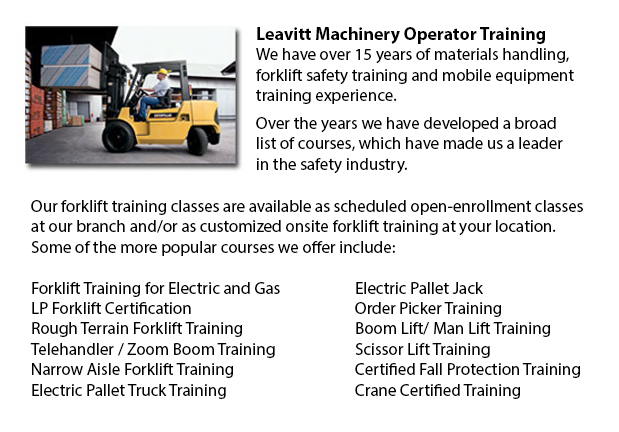
Calgary Forklift Training Classes - Forklifts are a kind of heavy lifting machinery utilized in order to handle and move material safely and efficiently. Occasionally known as Lift Trucks, they are made use of in various businesses. Personnel working with and around forklifts have to be trained to spot hazards connected with the use of forklifts.
We provide forklift training classes to be able to teach our trainees how to safely utilize a forklift. The theory part of the program will cover classes and instruction on becoming a lift truck operator. Trainees would learn their legal responsibilities as lift truck operators. Upon completing the classes, a printed certificate will be issued. The certificate should be signed by a person authorized to verify that a hands-on evaluation has been finished within the workplace of the trainee.
Forklift Safety
Lift trucks are made use of extensively in industrial work environment because of their ability to lift and transport heavy loads. These industrial machinery are essential and indispensable for a lot of groups, yet they can be dangerous if used by workers which is not properly trained. Forklift injuries, when they occur, tend to be serious because of the power of these heavy machines. Workers who work regularly around forklifts can become complacent and forget about the dangers. Important maintenance and operating measures might be neglected.
Forklift training is required not just for new workers. Periodic re-training is important for all operators. First aid training is also important.
The daily check is critically essential in the everyday maintenance and operations of a lift truck. The forklift might become damage if not properly maintained. Prior to being utilized, lift trucks should be visually checked as to their general condition. An operational check should be done to be able to determine the equipment is correctly working. The supervisor has to be alerted if anything is noted that can impact the safe use of the forklift.
An inspection determines if the place is clear of things which could pose a hazard. Whichever overhead obstructions should be noted. Check that a working fire extinguisher is accessible. Various levels must be checked, like for example radiator water, engine oil, fuel, and electrolyte levels in cells. Plugs, batteries and cables must be checked. Clean out vent caps and ensure that nuts, bolts, chains, guards, and hydraulic hose reels are not damaged, missing or loose. A tire check would make certain that wheels are not damaged or worn. Pneumatic tires will need a pressure check.
-
Calgary Crane Ticket
Calgary Crane Ticket - Modern cranes can either be simple or complex, based upon the nature of the use they could perform. For example, mobile cranes are rather simple units. A telescopic boom and even a steel truss mounts its movable platform. A sys... More -
Calgary Forklift Operator Certification
Calgary Forklift Operator Certification - Forklift operator certification is usually needed for employees working in construction, warehouse or industrial environments to ensure the safe operation of forklifts. Workplace training must follow a method... More -
Calgary Crane Operator Classes
Calgary Crane Operator Classes - For the supervisors and the operators, new and current, the crane operator training course is suitable for all. Course content addresses relevant state, federal and provincial safety regulations. The first part of tra... More -
Calgary Heavy Equipment Training School
Calgary Heavy Equipment Training School - The heavy equipment operator courses will assist the operator in obtaining the necessary knowledge and skills they will need in order to enter the workforce as an entry level operator. In this 12 week course... More -
Calgary Scissor Lift Operator Certification
Calgary Scissor Lift Operator Certification - Regulations within North America normally suggest that operators of booms, scissor lifts or aerial work platforms all acquire operator certification. Scissor lift operator certification is not mandatory,... More -
Calgary Aerial Boom Lift Training
Calgary Aerial Boom Lift Training - For people who operate or supervise the utilization of aerial lift platforms, right aerial boom lift Training is required. The aerial lift platform is used for lifting individuals, tools and materials to elevated w... More -
Crane Certification - Overhead Crane, Self-Erect Crane, Truck Mounted Crane, Hydraulic Cranes Certification in Calgary
Overhead cranes are otherwise called bridge cranes. They are a kind of crane that consists of a hook and line mechanism that runs along a horizontal beam which runs along two widely separated rails. Various overhead cranes could be seen inside a long... More -
Calgary Loader Operator Certification
Calgary Loader Operator Certification - Why You Need to Obtain A Loader Operator Certification - Certification for forklifts are required to ensure the safe utilization of forklifts for those employers in industrial, warehouse or construction setting... More

Forklift Certification Calgary
TOLL FREE: 1-888-254-6157
11330 - 70th Street, SE
Calgary, Alberta
forkliftcertificationcalgary.com
Email Us
About Us



